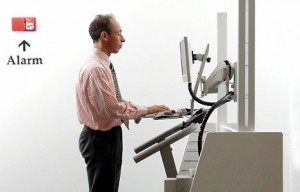

Can you use some scientifically sound shortcuts to fitness, weight loss and stress management that apply to our unique Jakartan existence? Probably, since many of us are stuck – for so many reasons – doing little or nothing about our wellness. We often cloak – and even ennoble – this inaction with the familiar litany of having ‘no time’ (with an average reported speed of 5 kilometres per hour on our streets, we even have data to support us, don’t we?). This of course assumes that all of our time is dedicated primarily to worthy and productive pursuits such as our work and our family and community obligations. If you are among the many Jakartans who have become comfortable doing nothing to improve your fitness, nutrition and the attendant burden of stress, be forewarned: reading this short article may be disruptive.
If you got this far, bravo; we can now move on to the first question. Can a really short fitness program produce significant benefits? Yes, absolutely. There is considerable evidence from reliable sources that you can reach and exceed recommended levels of cardiovascular fitness exercising for about 30 minutes a week (doing more is an option likely to produce even more benefits – up to a point). The article, “Two Experiments in Exercise Minimalism” (www.precisionnutrition.com) details how 8 minutes of exercise a day four times a week enabled a woman to lose 20 pounds in four months while eating a simple balanced diet. The case study provides all the details you need to start tomorrow (or better yet, the day after your doctor says it’s OK).


Exercise is a scientifically proven method to reduce stress. But if making time to get to a gym adds to your stress, consider getting a TRX – the suspension training device that you can use at home, and also take with you on your trips. You just attach it to a door and, using your body weight, you can get as complete a workout as you wish. You can find the device and training videos at PrimaFit stores all around town.
What’s the catch? OK, the bad news is that even the 32 minutes a week described in the case study will require you to move until you huff and puff; but the really good news is that the stress-reduction minutes can all be done in the back seat of your car, letting you magically convert a liability (our shared macet misery) into an asset.
The biggest obstacle to achieving the benefits of this elegantly short but scientifically sound health improvement strategy is in one of Newton’s Laws of Motion. It’s that really pesky one about how ‘a body at rest tends to remain at rest’ unless an unbalanced force acts upon it. Where does this “force” come from? It might be this article; it could be getting an overdue physical or a panting and thumping chest after you walk up a few flights of stairs. It could come from a good friend (or just a mirror) reflecting that you just ‘don’t look so great. It could be taking a quick self-test of your fitness. You might try the National Health Service’ online fitness self-assessment at: http://www.nhs.uk/Tools/Pages/Fitness.aspx
The really good news, though, once you decide to start, comes from Newton’s other law: ‘A body in motion tends to remain in motion…”




